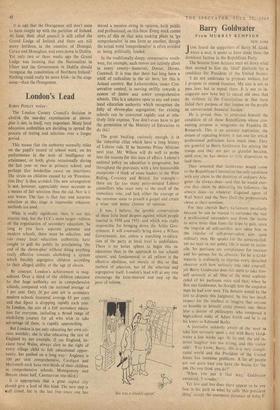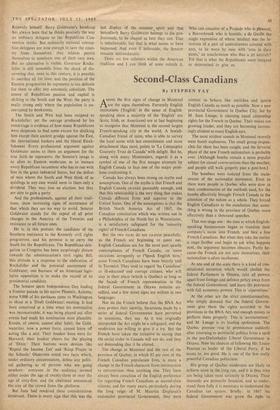Barry Goldwater
From MURRAY KEMPTON
NEW YORK JTUNE found the supporters of Barry M. Gold- water a sect; it seems to have made them the dominant faction in the Republican Party.
The Senator from Arizona once set down what then seemed to him the 'ideal' platform for a candidate for President of the United States: 'I do not undertake to promote welfare, for I propose to extend freedom. My aim is not to pass laws but to repeal them. It is not to in- augurate new laws but to cancel old ones that do violence to the Constitution or that have failed their purpose or that impose on the people an unwarranted financial burden.'
He is proud, then, to announce himself the candidate of all those Republicans whose con- suming purpose is vengeance on Franklin D. Roosevelt. This is an amateur aspiration; the dream of repealing history is not one for which professional politicians have much time. They are grateful to Barry Goldwater for stirring the troops and they are just as grateful because, until now, he has shown so little disposition to lead them. .
They assumed that Goldwater would come to the Republican Convention the only candidate with any claim to the devotion of ordinary dele- gates—he always does—and that he would exer- cise that claim by delivering his followers—he always does—to whatever disguised agent of Wall Street and the New Deal the professionals chose as their nominee.
For they cherish Barry Goldwater peculiarly because he can be trusted to surrender the way a professional surrenders and from the desire to serve more than from the hope to gain, since the impulse of self-sacrifice acts upon him as the impulse of self-preservation acts upon ordinary men,. He speaks for the unreconciled; yet no man in our public life is easier to recon- cile; 'his partisans are conspicuous for rancour and his person for its absence. To be a Gold- waterite is ordinarily to oppress every detached observer with how seriously you take yourself; yet Barry Goldwater does not seem to take him- self seriously at all. One of the most sophisti- cated of his partisans once said that, when he first met Goldwater, he thought him the stupidest man he had ever seen. The Senator would be the last to dispute this judgment; he has too much respect for the intellect to imagine that an one so humble as himself could possess one. Show him a doctor of philosophy who composed a high-school stUdy of Adam Smith and he is on his knees to Edmund Burke.
A journalist suddenly aware of the need to take him seriously spent a day with Barry Gold- water a few weeks ago. At its end, the old in- terior laughter was too strong, and this visitor said: 'You know, Barry, this is a very compli- cated world and the President of the United States has immense problems. A lot of people arc not quite sure you have the brains for the job. Do you think you do?'
'When you put it that way,' Goldwater answered, 'I wonder.'
Yet less and less does there appear to be any lion in his path to what he calls 'this president thing' except the enormous riresence of John F. Kennedy himself. Barry Goldwater's handicap has always been that he thinks precisely the way an ordinary delegate to the Republican Con- vention thiriks. But ordinarily national conven- tion,delegates are wise enough to save the coun- try from themselves; they seldom permit themselves to nominate one of their very own. But no alternative is visible. Governor Rocke- feller is still immobile from the shock of dis- covering that, even in this century, it is possible to sacrifice all for love; and the position of the Eastern progressives he represents is too delicate for them to offer any automatic substitute. The centre of Republican passion and capital is shifting to the South and the West; the party is really strong only where the population is un- corrupted by bookstores.
The South and West had been resigned to Rockefeller; yet the outrage produced by his remarriage is evidence of how many Republicans were desperate to find some excuse for disliking him except their ancient grudge against the East, the international bankers and the liberal Estab- lishment. Every professional argument against Goldwater seems to them an argument for the true faith he represents; the Senator's image is so alien to Eastern moderates as to menace every Republican incumbent who has to run with him in the great industrial States; but the defeat of men whom the South and West think of as quislings in any case would seem to them only a dividend. They may lose an election, but they are sure to gain a party.
And the professionals, against all their tradi- tions, show increasing signs of acceptance of that which they see •no way to avoid. Senator Goldwater stands for the repeal of all prior changes in the America of the Twenties and resistance to all future ones.
He is, in this posture, the candidate of the Southern resistance to the Kennedy civil rights programme, and his promise is to carry the South for the Republicans. The Republican dele- gation to Congress has been surprisingly distant towards the administration's civil rights Bill; this attitude is a response to the abdication of Rockefeller and the potential anointment of Coldwater; one business of an American legis- lative opposition is to make the record of its presidential candidate.
The Senator spent Independence Day leading a frontier parade in his native Phoenix, Arizona; some 9,000 of his partisans came to Washington to shout at a 'Draft Goldwater: meeting. It had been conceived at a time when his nomination was inconceivable; it was being played out after events had made his nomination most plausible. Events, of course, cannot alter habit; the Gold- waterites, now a power force, cannot leave off acting like a sect. Their loudest boos were for Harvard; their loudest cheers for the playing of 'Dixie.' Their buttons wore devices like 'Repeal the Income Tax' and 'Keep Prayer in the Schools.' Observers noted two facts which, under ordinary circumstances, define any politi- cal gathering as of persons who are going nowhere: everyone in the audience seemed either under the age of twenty-three or over the age of sixty-five; and the chairman announced the size of the crowd from the platform.
But June had rendered these considerations irrelevant. There is every sign that this was the last display of the amateur. spirit and that henceforth Barry Goldwater belongs to the pro- fessionals, to be shaped as best they can. That is unbelievable, but that is what seems to have happened. And even if believable, the Senator remains untranslatable.
There are few referents within the American tradition and I can think of none outside it. Who can conceive of a Poujade who is pleasant, a Beaverbrook who is humble, a de Gaulle the single expression of whose intellect was the in- vention of a pair of underdrawers covered with ants, to be worn by men with 'ants in their pants,' an anachronism who flies a jet aircraft? Yet that is what the Republicans seem resigned or determined to give us.



































 Previous page
Previous page